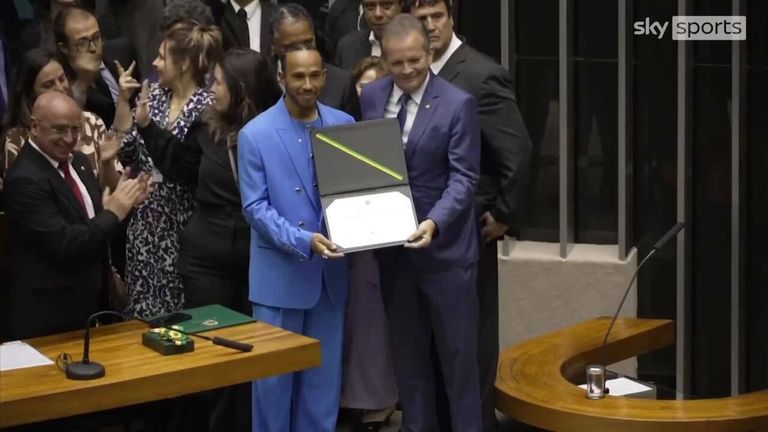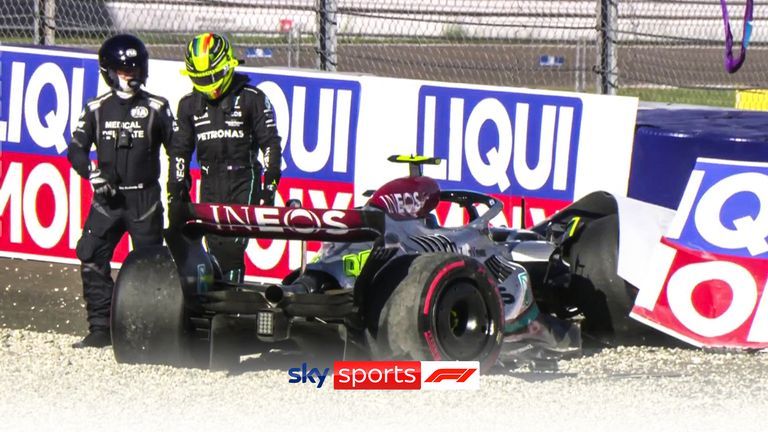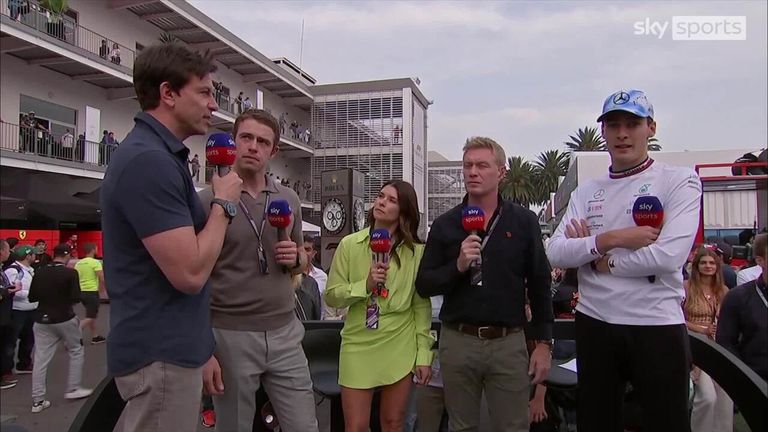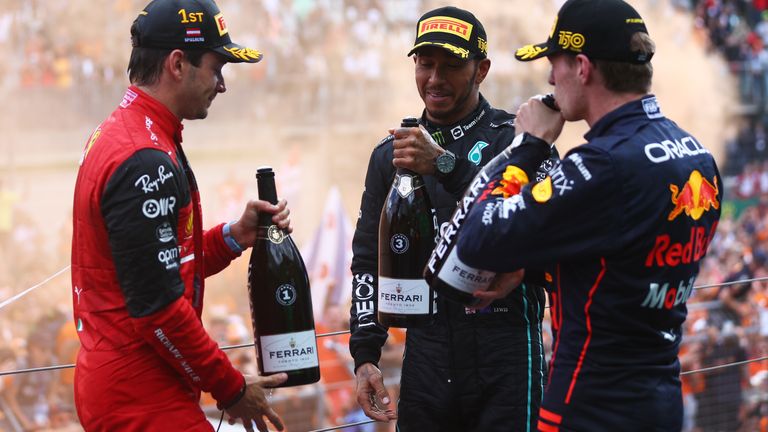Mercedes: Why there's now light at the end of the tunnel as poor 2022 recharges F1 team for Red Bull fight
Mercedes have yet to win a race in 2022 and yet, there are plenty of reasons for cheer as they prepare for a "DNA" change in their car; From overhauling Ferrari to having a 2023 edge on Red Bull, we look at Mercedes' hopes ahead of this weekend's Sao Paulo GP
Wednesday 9 November 2022 16:25, UK
With just two races to go in Formula 1 2022, it now looks more than likely that Mercedes - the team that entered the season on an unprecedented run of title dominance - will finish the year without even a single race win. Not since 2012, pre-Lewis Hamilton's arrival, has that happened.
But amid those struggles, the whole Mercedes team have stayed patient, and positive, and it now appears there are genuine reasons for optimism as they bid to bounce back next year. Why? Let us explain...
Step one: Understanding where they went wrong
The biggest hurdle for Mercedes to clear was figuring out what exactly went wrong with their 2022 car so they knew how to fix it for 2023, when - as opposed to this season - F1's rules are virtually unchanged.
- F1's sprint race returns! When to watch Sao Paulo GP all live on Sky
- 'Now I'm one of you' | Hamilton and Brazil: A special relationship
- Ricciardo 'in talks with Merc & Red Bull' | Wolff: He'd bring personality
"We can almost trace it back to a single decision last October." team boss Toto Wolff told Sky Sports F1.
That decision, was a car concept that simply has not worked.
Mercedes, following a steady first test in Barcelona, brought an all-new car to the Bahrain test, one that featured a 'zero-sidepod' design and had the paddock purring. This, most thought, was the latest masterstroke interpretation of the regulations from the world champions, which would see them vault to the front.
But Mercedes did not foresee in their simulations the violent porpoising - bouncing, for those unclear - that plagued nearly all of the all-new 2022 cars. Already intending to run their car lower to the ground to improve aerodynamics, they suffered more than most.
"They were all telling us we were gonna have a massively quick car," explained Lewis Hamilton recently. "But it's been a bunch of different things from the get-go.
"Bouncing was the dominant one and the most visible. But the aero characteristics are difficult… the stiffness of the car to the point where the suspension is pretty useless, stiffer than the tyres.
"Drag is a huge problem for us. When we get to a certain speed that's when other people are pulling away. It's when you brake and the front dips and the rear comes up and the aero transfers during that period and when you get on the power."
So Mercedes had a car that bounced on the straights and into the corners, and was being eased away from on the straights.
Their best finish from the first 11 races was a lowly third, with Red Bull and Ferrari romping clear.
Have Mercedes fixed their car and overhauled Ferrari?
The British GP offered Mercedes their first real glimmers of hope for 2022 - with Hamilton well in the hunt for his first victory - while the Austrian and French GPs followed suit with pole and win chances. Since then, Mercedes have been genuine contenders against Red Bull and Ferrari more often than not.
Mercedes won't digress all their issues publicly but they have brought plenty of upgrades this season - seemingly more than their rivals at the front - and that's something that was only possible after finally understanding the problem.
August's rule changes to aid teams' porpoising woes have also certainly helped.
"I think we understand more now," explained Wolff. "We believe that we understand where the gap comes from."
More encouragingly, is Mercedes' rise to become Red Bull's main challengers over Ferrari.
The Silver Arrows have five second-place finishes in the last nine races and scored 220 points to Ferrari's 184, while their qualifying speed is also quickly catching up with the race pace that has been strong all season.
Given how far ahead of Mercedes Ferrari were at the start of the season - when they even had a quicker car than Red Bull - that is some turnaround, and should give the team plenty of hope heading into 2023.
However, as ever in F1, there is a counterpoint.
"Mercedes has recently developed its car more aggressively," insisted Ferrari boss Mattia Binotto. "We got out earlier and are concentrated fully on 2023."
The teams are now split by just 40 points in the Constructors' Championship, and we'll see just how much Mercedes have really caught up - and whose approach into 2023 works better - soon enough.
Can Mercedes reel in Red Bull in 2023?
The big challenge for both Mercedes and Ferrari in 2023 will be catching a Red Bull team that has won nine straight races in 2022. But Mercedes are, and should be, optimistic.
First, there is the fact Mercedes, having understood their flaws of this year's design, are working on a new concept.
"The DNA of the car is going to change for next year, it's clear," said Wolff.
"It doesn't necessarily mean that the bodywork is going to look very different but certainly what is part of the DNA of the car with the architecture will change for next year.
"Certainly, were we to go back 12 months, we would be a lot wiser and a lot better informed about what sort of car we want to develop, and I think he would have simply been referring to the fact that recent learning has helped us clarify and understand what we should have been doing 12 months ago."
Given 2022 was the first blip from Mercedes' aerodynamicists in a 10-year period, don't be surprised to see a flawless new machine.
Secondly, there is the very real prospect of Mercedes being able to catch their rivals through developments.
Mercedes have already shown their prowess with in-season upgrades this season while, if they finish third this year, they will have considerably more wind tunnel time - where teams run the car to finesse aerodynamics - than Red Bull and Ferrari, due to F1's sliding scale for testing.
Teams get more runs in their wind tunnels the lower down they finish in the championship.
Even better yet for Mercedes, Red Bull have will lose a further 10 per cent of their wind tunnel time for breaching F1's cost cap from 2021.
"I think any reduction in wind tunnel time is going to cost you some performance," Wolff said.
"We've been in the fortunate situation that we won the championship (last year), so for 18 months we had seven per cent less than Red Bull every single half year. Overall that adds up, and if you look at Ferrari's performance, they were sixth the previous year, so massively more performance.
"So we are, unfortunately, benefitting from being third on the road, with 14 per cent more on the leader, and then we have another 10 per cent, so that is quite a lot, but it needs to be well utilised."
There is still a long road to climb, but there is certainly light at the end of this Mercedes tunnel. And this unexpectedly poor 2022, may have just awoken an F1 beast.
"We're playing the long game here, all of us," Wolff added. "Both drivers are playing the long game, the team.
"The judge around the team, of performance, is not based on a single year or weekend. It's how we have been able to win championships over the long term."







